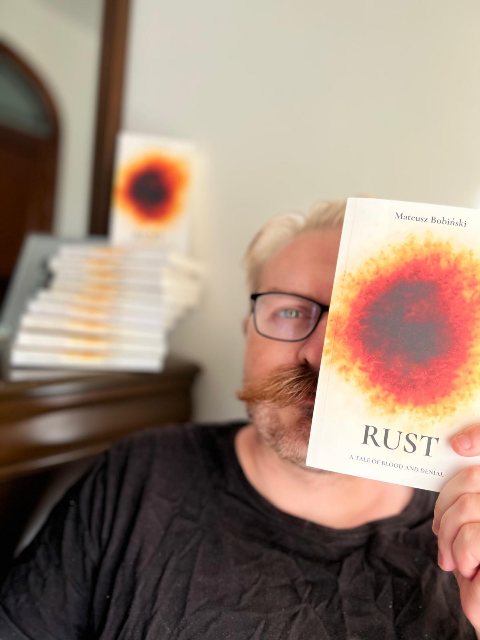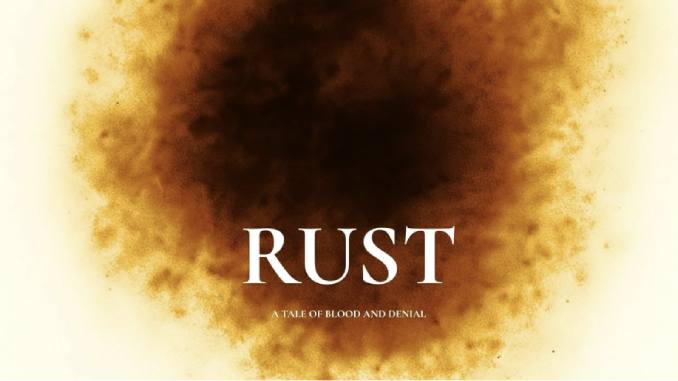This post contains affiliate links. If you click on a link and make a purchase, this blog earns a small commission at no extra cost to you.
In his dark debut novel “Rust”, author Mateusz Bobiński strips the vampire myth of any romanticism, revealing it for what it can be at its core: a metaphor for addiction, loss of control, and the slow erosion of one’s own humanity. In this interview, he talks about the inspirations behind his work, the symbolism of decay, and why the themes of addiction and self-loss made this first story inevitable for him.
Hi Mateusz, Congratulations on your new book. I think it’s excellent and definitely more than just a worthy addition to every horror novel readers book cabinet. To start with a personal question: You live in sunny Malta and are a family man. What is your connection to vampirism?
Mateusz Bobiński: Thanks for inviting me. I’m thrilled “Rust” gave you the chills (and I hope it didn’t leave you too gloomy!). As for Malta, it’s sunny, with friendly people, dramatic rocky beaches, and a wonderfully diverse food scene. After a few years, you start to see the underbelly of any place, but that’s a story for another time.
The seed for “Rust” only truly sprouted a few months ago, even though themes of addiction, despair, and loss of control have been simmering in me for years. I wanted to strip vampirism of its glamour – no sunlit strolling, no superpowers – just the raw, corrosive horror of humanity eroding drop by drop.
Rust, by nature, is slow, yet your protagonist’s transformation is violent. So what is the “rust” in this book – a long process or a sudden, irreversible rupture?
MB: Think of rust on a cast-iron skillet: the oxidation creeps in slowly, then one day you discover years of neglect in a few flaking spots. In “Rust,” the corrosion of Jonathan’s soul is just as insidious. He wakes up craving blood – a little harmless indulgence – then a month later realizes he’s consuming twice as much per day and he is loosing his humanity in process. Vampirism in my variation begins as a strong but somewhat manageable… impulse but, drop by drop, remorselessly turns into something monstrous. It’s both gradual and brutally transformative.
Is the hunger in “Rust” an external force that overcomes the character, or is it something that was always latent within him, waiting to be awakened?
MB: Jonathan was already hungry – hungry for recognition, for connection, for meaning. Being turned simply redirected that hunger toward blood. Vampirism doesn’t magnify one’s virtues nor bad qualities; it exposes the darkness in everyone stripping you off your humanity. I used vampirism as a metaphor for any consuming addiction: the monster isn’t born overnight, but awakened by forces we don’t fully control.
Get your copy of Rust on Amazon.com now (#ad)
The book’s dark, existential mood is reminiscent of certain works of film and literature. Which authors or directors were an inspiration for you while creating this world? Do you feel closer to classic noir, or perhaps to the films of Cronenberg or Lynch?
MB: My biggest inspirations if I would look for any, were:
- Let the Right One In (John Ajvide Lindqvist / Tomas Alfredson) for its unflinching, intimate take on vampirism
- The Deer Hunter (Michael Cimino) for its depiction of trauma and fractured psyches
- The Addiction (Abel Ferrara) for its raw, allegorical approach to vampirism as addiction
- Only Lovers Left Alive (Jim Jarmusch) for its languid, atmospheric style
The transformation you describe is simultaneously an act of destruction and creation. How important was it for you to explore this tension between destruction and a perverse form of birth?
MB: Jonathan’s turning is an act of a fickle god: in creating a new creature, something of the old self must be destroyed. I wanted to show that every creation involves sacrifice – that birth and death are tangled in every metamorphosis.

Is the vampirism in this story the ultimate fall of humanity, or is it a tragic escape from the emptiness and superficiality of modern life?
MB: “Rust” is a small, intimate portrait of a fragment of Jonathan’s journey – both before and after the change. It doesn’t seek to answer whether vampirism is a fall or an escape on a grand scale; it simply asks what it feels like to lose your humanity, one thirst at a time.
The book features powerful, minimalist symbols, like the dog’s empty leash. How important is the symbolism of detail in your narrative – a detail that can say more than a long scene?
MB: I admire Chekhov’s principle: if you show a rifle on the wall, it must go off. I try to weave small details into the narrative so they resonate later. A single image – a leash, a splintered mirror – can carry emotional weight that outlasts pages of exposition.
Time in the novel seems to disintegrate and “stutter.” Why is the destruction of a normal sense of time such a crucial element of this story?
MB: For someone in the grip of addiction, time warps: days blur, moments stretch or collapse. By fragmenting time in the narrative, I wanted readers to feel that disorientation alongside Jonathan.
You studied philosophy and theatre. How did these fields influence your style and your decision to tell a story through atmosphere and understatement, rather than just through action?
MB: Philosophy taught me that a single word or silence can carry layers of meaning; theatre showed me how subtext and gesture can speak louder than dialogue. I aimed for economy: fewer words, but each chosen to evoke emotion and mood.
Why did you choose such a dark and difficult subject for your literary debut? What made it so this story had to be told first?
MB: No subject is inherently difficult if you prepare, research, and craft it thoughtfully. I chose “Rust” because its themes of addiction and the erosion of self resonated deeply with me – and because I wanted to confront the rawness of that descent without dressing it up.
Final question: In the world you’ve created, is there any way back for someone who has undergone such a transformation? Or is the only form of redemption the full acceptance of the monster they have become?
MB: That’s an excellent question – one I’m still pondering myself. Perhaps your readers will find clues in my next book, which continues to explore obsession, addiction, revenge and the possibility of transformation.
Tom is the chief wordsmith at beachtenswert.info and welcomes feedback with open arms. He’s been crafting stories since 2012, dabbles in book authoring, and has a profound love for meandering around the globe (emphasis on ‘meandering’).

